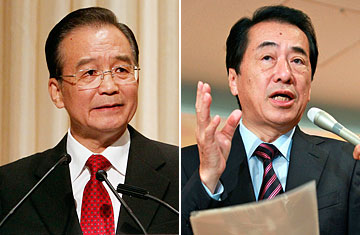
Chinese Premier Wen Jiabao, left, and Japanese Prime Minister Naoto Kan
The release of a Chinese fishing-boat captain held by Japan was a sudden, surprising denouement to a crisis that threatened to cause serious harm to the already weak ties between Asia's two largest economies. While the immediate cause of the underlying tension has been eased, deeper rifts remain. The latest clash shows the enduring instability of ties between China and its neighbors.
Zhan Qixiong, who was detained on Sept. 7 after his trawler collided with two Japanese coast guard vessels, was flown to his home in Fujian province on a plane chartered by the Chinese government. The lanky, tan 41-year-old fisherman was greeted by Chinese officials and walked off the plane in the early-morning darkness of Sept. 25 with his hands aloft in victory signs. "This is definitely a diplomatic win for China," says Zhou Yongsheng, a professor of international relations at China Foreign Affairs University in Beijing. "Japan had been sticking to its domestic laws all along and refused to release the Chinese captain because of that. But in the end, their release of the captain means that they have given up on that effort under mounting pressure from the Chinese government."
Indeed, Japanese prosecutors cited growing tensions with China in their decision on Sept. 24 to release Zhan. In the weeks following his arrest, Beijing escalated the pressure on Tokyo, calling in the Japanese ambassador to Beijing five times and suspending ministerial-level meetings with Japanese officials. On Sept. 21, Chinese Premier Wen Jiabao urged Japan to release Zhan, warning that "if Japan acts arbitrarily, China will take further actions, and Japan must bear all the consequences." In the days that followed, it appeared that China was living up to the threat. On Sept. 23, the New York Times reported that China was blocking exports to Japan of rare-earth elements, which are used in manufacturing high-tech equipment, including military hardware. Both governments denied knowledge of a ban, but the story itself was enough to spark fears that China was using its economic clout to cow its neighbors. Then China detained four Japanese nationals on suspicion of illegally entering and videotaping in a restricted military area in Hebei province, prompting concerns the move was in retaliation for Zhan's arrest.
While the captain of the Minjinyu 5179 was the focal point of this latest Sino-Japanese spat, it wasn't ultimately about him. Rather, he was the flesh-and-blood embodiment of the dispute over an island group in the East China Sea known as the Diaoyu in Chinese and the Senkaku in Japanese. Japan has held them since the U.S. ended its post–World War II administration in the early 1970s, but China has laid claim to the uninhabited islets, citing records that go back hundreds of years. A 1969 U.N. report attracted political attention to the discovery of potential gas deposits in the surrounding seabed, raising the potential value of controlling the islands. They are also part of the "first island chain," bodies of land in the East and South China seas that constrain China's ability to exert naval force in the Pacific. The dispute is also colored by Japan's brutal occupation of China in the 1930s and '40s, a subject that is emphasized in Chinese history classes.
Zhan's release isn't likely to lessen the anger between the two Asian powers, as the fundamental issue of the islands remains. Indeed, in the days following, both sides continued to trade blows. China's Foreign Ministry demanded an apology and compensation from Japan for the captain's arrest. Japanese Prime Minister Naoto Kan rejected those demands on Sunday, and on Monday, Chief Cabinet Secretary Yoshito Sengoku suggested that Japan ask China to pay for the damage incurred by the Japanese patrol boats in the collision. And Japanese newspapers reported on Monday that Chinese customs officers were stepping up inspections of Japanese imports and Chinese exports bound for Japan.
Such a move would hurt Japan's stagnant economy, which was surpassed this year by a steadily expanding China. But Chinese exporters could also be hit, not just from a slower flow of their goods to Japan but also by the fear from other importers that their business could be hindered by diplomatic skirmishes.
Likewise, Zhan's release may prove an ephemeral victory for Beijing as it raises questions about China's intentions. "In the short term, they may appear to have achieved their objective, both in term of getting the skipper released and in term of challenging Japanese authority over those islets," says Steve Tsang, a China specialist at Oxford University. "But causing Asian neighbors to be concerned and causing the U.S. to come out quite openly to reiterate its defense commitment to Japan includes the Diaoyus. It's not going to persuade the rest of world that China is rising peacefully."
— With reporting by Jessie Jiang / Beijing
